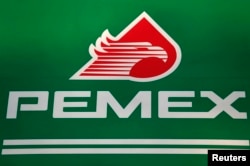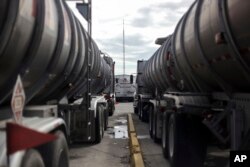Oil firms that have won drilling rights during Mexico's landmark energy reforms have made little progress on developing about two-thirds of the
projects because of the nation's tangled regulatory regime, according to company executives and government data.
Mexico has auctioned off more than 100 contracts to foreign and local companies since President Enrique Pena Nieto started opening the nation's oil fields to foreign investment in 2013.
A new oil regulatory framework, much of it adapted from existing rules, has kept most of that oil in the ground, the data show. That's delaying potential benefits to Mexico and could make the reforms that much easier to unwind if voters elect an anti-reform candidate for president when Pena Nieto
leaves office at the end of November.
Securing approvals is a "cumbersome and arduous process resulting in a significant choke point for drilling wells," said Craig Steinke, chief executive of Renaissance Oil Corp., which has five projects in Mexico, three of them stalled in permitting.
It takes three days to get needed drilling permits for a well in Alberta, Canada, compared with more than a year in Mexico, Steinke said. Through the life of a project, oil firms are required to submit more than 250 separate documents to about a dozen government agencies overseeing offshore and onshore developments.
New regulator
Before Mexico's energy reforms, state-owned oil firm Petroleos Mexicanos, known as Pemex, was the sole operator and largely regulated itself. The opening of development rights to private firms ushered in a new regulator, known as ASEA, operating under a presidential appointee with sweeping powers — but also a legacy of bureaucratic constraints.
ASEA, Mexico's safety, energy and environment regulator, must decide on about 100 permits for each project, according to Marco Cota, a former head of exploration and production for the energy ministry who now advises oil companies on regulatory compliance. Many of the agency's industrial safety regulations were inherited from the environment ministry and duplicate
paperwork required by other agencies, he said.
ASEA Director Carlos de Regules, a former Pemex official, conceded in an interview that the agency's decision-making has been too slow. He said he is working to cut permit reviews to 120 days by September — compared to the current process that can stretch nearly a year and a half.
"The regulatory framework is very complicated, and it forces us to take more time than in principle should be necessary to evaluate a project," he said of rules in place since the energy reform laws were enacted. "We are obligated to ask seven times for the same paperwork."
Waiting for months
Evaluations can take about six months for environmental impacts and three months for a final drilling permit, just two of the approvals required before work can begin on a new well.
Companies also must show they have insurance policies and industrial safety and environmental protection plans approved and in place for each project. The latter requires companies to submit reams of supplemental documents such as safety manuals.
The delays stem in large part from the fact that ASEA is adapting and interpreting laws originally written for general environmental protections and were not specific to the energy industry, said Layla Vargas, who works with oil companies to meet government regulations.
"What they've had to do is half-improvise" to fit the energy sector, said Cota.
Staffing shortages are another major bottleneck. The regulator has 465 employees who handle approvals for more than 25,000 project applications since the 2015 oil-market opening, ranging from retail gas stations to multimillion-dollar drilling projects. Permits for a service station can take as much as seven months to approve, according to the agency.
The Organization for Economic Cooperation and Development, which promotes economic development, last fall called for ASEA to have more "institutional agility and autonomy" in its evaluation of Mexico's energy regulators.
Projects in pipeline
ASEA's administrative complexity is the biggest challenge to getting oil and gas projects underway, said Renaissance Oil's Steinke and other oil company executives.
So far, ASEA has signed off on insurance policies for 37 of 107 oil and gas contracts awarded. The companies' management system, a custom plan for mitigating risks in 18 environmental, health and safety areas, has been authorized for 51 projects.
Approvals for both are needed before drilling can begin. To date, 107 exploration and production projects won at auction by international oil firms including Exxon Mobil and Royal Dutch Shell are in various stages of
regulatory process.
The numbers of approvals "are not great," said a senior executive at an oil major who oversees contracts in Mexico, speaking on condition of anonymity.
At least one oil company said it has not had problems with unreasonable delays.
"We've had a good experience in Mexico," said Felipe Arbalaez, BP plc's president for Latin America.
The regulators have "given us approvals at the appropriate time," he added, referring to the British company's shallow water Hokchi project, which is run by its Argentine unit, Pan American Energy.
But John Padilla, a Bogota-based oil consultant with IPD Latin America, said oil companies who bet big on the Mexican opening are increasingly concerned about the political and regulatory risks.
"No one's jumping ship," he said. "But when you have billions of dollars of investment at stake, you can be damned sure that every board out there around the globe that has investments in Mexico is going to be paying close attention to this."








